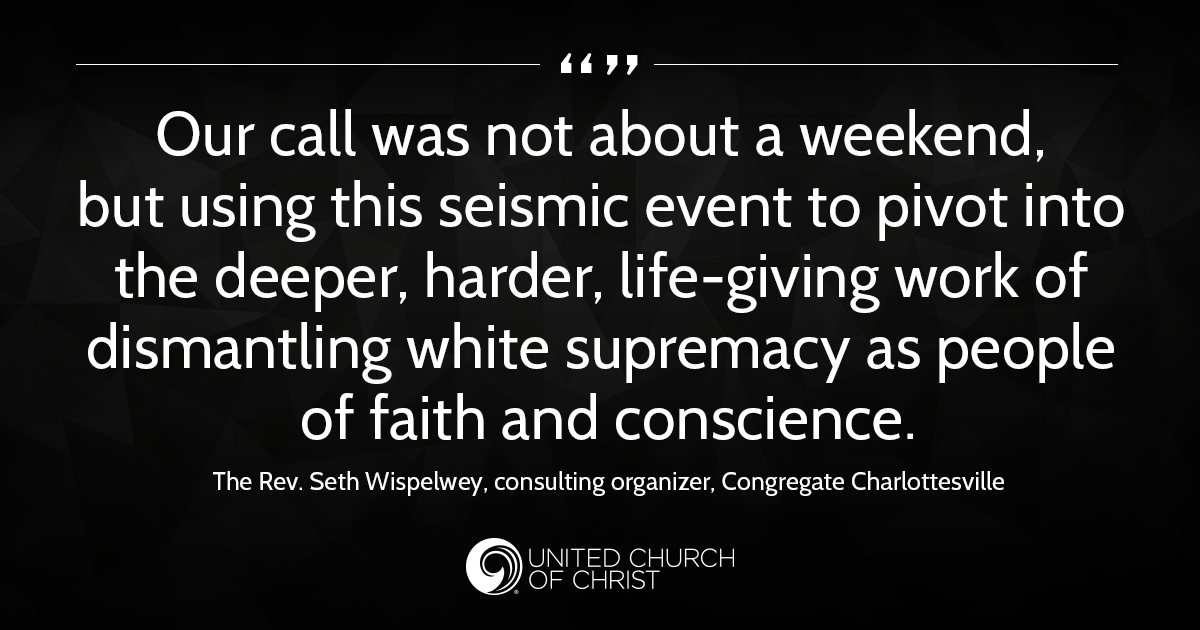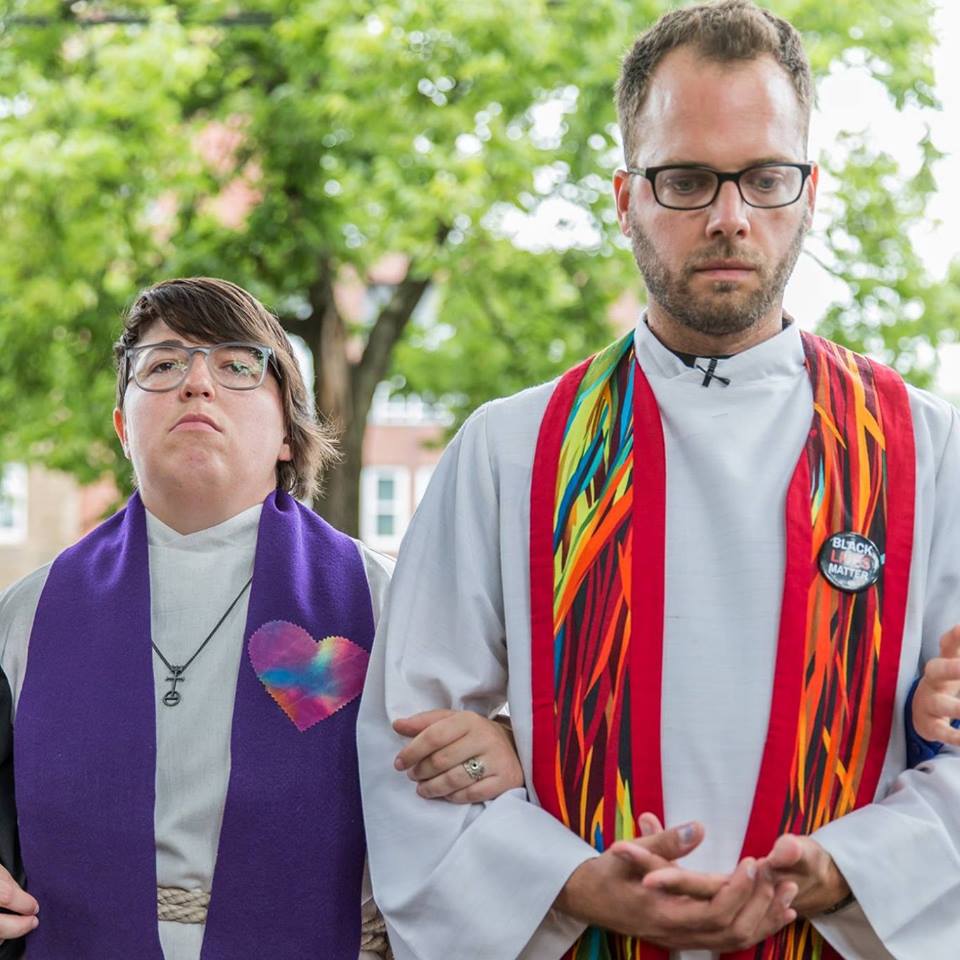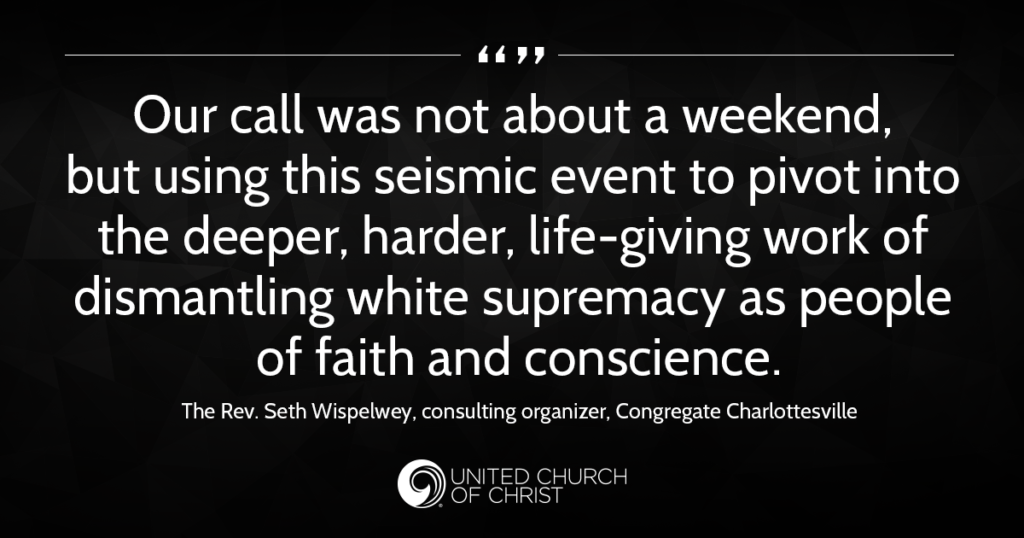Congregate Charlottesville plans Service of Remembrance and Repair as resistance to white supremacy
 Love over Fear. That was the message delivered by faith leaders and anti-racist allies almost a year ago in Charlottesville, Virg., when white supremacists brought their hate-fueled ‘Unite the Right’ rally to that college town on August 11-12, 2017. That same message — Love over Fear — resonates today as the clergy of Congregate Charlottesville prepare to mark the anniversary of the event that terrorized their community and left a woman dead — as they ready resistance for another white supremacist rally planned for Sunday.
Love over Fear. That was the message delivered by faith leaders and anti-racist allies almost a year ago in Charlottesville, Virg., when white supremacists brought their hate-fueled ‘Unite the Right’ rally to that college town on August 11-12, 2017. That same message — Love over Fear — resonates today as the clergy of Congregate Charlottesville prepare to mark the anniversary of the event that terrorized their community and left a woman dead — as they ready resistance for another white supremacist rally planned for Sunday.
“Charlottesville has continued to experience the presence or threat of white supremacists since August 11-12 of last year. In so many ways, we’ve had to maintain readiness for not just the potential of violence and harassment of vulnerable communities, but the retraumatization that occurs for many every time there’s a threat or a court date,” said the Rev. Seth Wispelwey, consulting organizer of Congregate Charlottesville. “What we set up with Congregate has continued to grow a steady a presence in these moments throughout the year.”
Congregate Charlottesville is faith-rooted action and justice oriented education, organized by three UCC clergy and their allies last summer. The Revs. Seth and Tracy Howe Wispelway, and lead organizer, Rev. Brittany Caine-Conley, are all members of Sojourners UCC, just outside downtown. Their group, which prepares people of faith to bear public witness to (in)justice, has planned a community service of remembrance and repair this weekend, to give space for healing, to honor those who put their bodies on the line last summer, and to offer a challenge to “those of us who need to wrestle with and repent for our complicity in white supremacy.”
“We still have a long way to go to heal from this recent trauma and all of us (beyond and including Charlottesville) have a long way to go repairing and healing from the historic and systemic trauma of racism and white supremacy,” said the Rev. Tracy Howe Wispelway, UCC Minister of Congregational and Community Engagement, another Congregate organizer. “But we also have the resources for this work, repentance, repair work, beauty and justice making. In this service of remembrance and repair, we are embracing resources of spirit and community beyond our predominantly European Christian institutions as well.”

The Revs. Brittany Caine-Conley and Seth Wispelwey
Photo: Jill Harms Photography
The service, scheduled for Saturday from 3-5:30 p.m. at the First Presbyterian Church in Charlottesville, will be led by six women of color, who will offer poetry, music, dance, contemplation and communal ritual. After the experiential service, interfaith service will break out into spaces of learning and repair, to provide participants with practical, actionable ways to enter into the work of justice making and repair.
“During our trainings and service last year, we consistently stressed that our call was not about a weekend, but using this seismic event to pivot into the deeper, harder, life-giving work of dismantling white supremacy as people of faith and conscience,” Seth Wispelway said. “Our Service of Repair is rooted in the same spirit and message, and practically we will be gathering together in small groups to offer up concrete opportunities for bodily solidarity, advocacy, and/or education in the community — related to affordable housing, resisting ICE, and more. But first we must and will attend to the spiritual needs of the community — especially those people of color, queer folks, and more who have done so much work and held so much of the pain. We must repair ourselves to be of use long term.”
And their hope is that people of faith and anti-racists around the country join them — wherever they are.
“I want folks to be inspired to organize and act in their own communities,” said the Rev. Brittany Caine-Conley, Congregate’s lead organizer. “I think it’s important to point out that resisting and confronting white supremacy is working; white supremacist groups are crumbling and white supremacists are beginning to be held accountable. I hope to honor those who continue to risk their reputations and their comfort for the sake of justice.”
“This week in Charlottesville we are praying and planning our own solidarity, comfort, and action in the community as needed for what is sure to be an emotionally raw weekend,” Seth Wispelway said.
“I hope that local churches start incorporating organizing and public witness as well as trauma care and resilience work into their liturgical life,” Tracy Howe Wispelway said — a comment underscored by Congregate C’Ville’s written call to action for people of faith.
“No matter our faith traditions, we are all called to resist evil. We are called to enact justice. We are called to sacrifice for the sake of our human siblings. Transformation, goodness, and justice will not occur unless we are willing to risk our comfort, risk our reputations, and even risk our livelihoods. Let us remember that non-violence does not mean non-action. We are grounded in non-violence and non-passivity. We choose justice over civility. We remember that there is no peace without justice. We proclaim love over fear.”
The Revs. Tracy Howe Wispelway and Brittany Caine-Conley co-authored a ‘Remembering #Charlottesville’ liturgy to help other faith communities remember the tragic events of last August, allow for repentance in complicity in white supremacy, honor the resiliency of marginalized communities, and enter into streams of repair. The Liturgy can be accessed here.
Related News
A Prophetic Call for Justice and Peace in Palestine
The executive leaders of the United Church of Christ have issued the following statement...
Read More‘Love is Greater Than Fear’: Regional Youth Events get to the heart of gospel message
United Church of Christ teens attending this summer’s Regional Youth Events (RYE) are...
Read MoreUCC desk calendars available to order now
Prepare for your day, month and year with the United Church of Christ desk calendar —...
Read More


